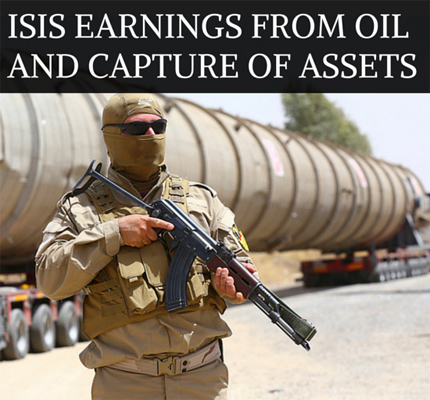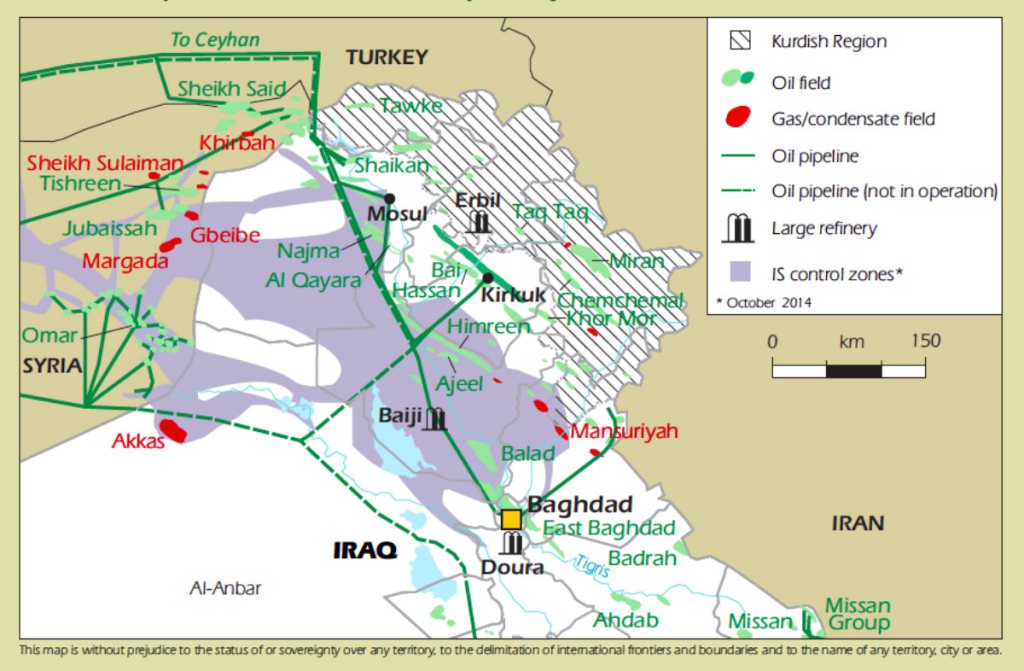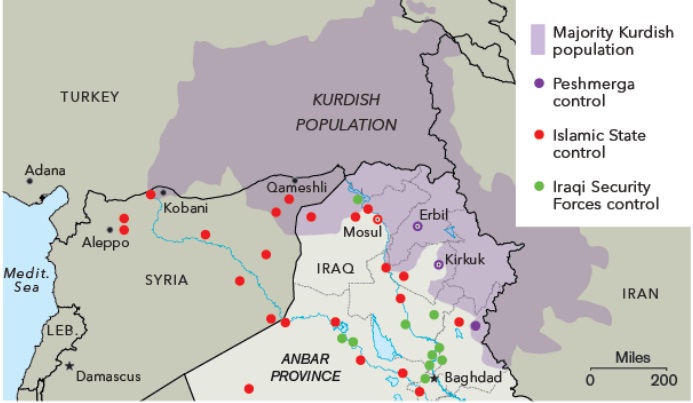ISIS Earnings from Oil and Capture of Assets
M. Ahsan Jamal
Like all organizations, money matters to ISIS (Fawaz Gerges).
Islamic State of Iraq and Syria (ISIS) heavily relies upon the revenue earned by oil production and criminal activities (including extortion, theft and plundering) for two main reasons: primarily to fund its soldiers (who number between 20,000 and 31,500 according to the CIA) and secondarily to act like a state and legitimize its authority in the eyes of citizens (by providing them with food, electricity and fuel).
Unlike other terrorist organizations ISIS has concentrated on expanding its area of control by taking hold of natural resources and commercial centers, as well as tens of thousands of tons of weapons and ammunition.
The Islamic State began earning about $2.2 million a day during first few months of 2014 by selling oil on the black market which came down to $1.9 during second half of October 2014 and later 1.1 million a day in early November.
The total earning was estimated to be around $900 million a year or more than 1.4 billion in 18 months time since it took control of leading refineries and oil producing areas. Experts have estimated that ISIS leaders had managed to produce 55,000 to 61,000 barrels a day until second week of October 2014. But the production and supplies were cut down after counter attacks by U.S. and Iraqi forces. IS had managed to controls 350,000 barrels a day of capacity until October 2014.
Initially the IS managed the selling oil at $51 to $62 a barrel with the help of Koc (Koch Holding Soban representatives of Turkey and and Funduk brothers of Saudi Arabia but later the price was cut down to less than $24 per barrel.
Supply capacity were cut by half after October 2014 but the payment of more than US$ 415 million were due to be paid to IS by the ‘third parties” which included business representatives of Lebanon, Turkey and Dubai-based businessmen.
Islamic State representatives were able to consume about half its production but they have managed to maintain a price of an average of $38 a barrel until October 2014 and later an average of 28 dollar in the first half of November 2014. The official price in open market for Brent futures settled at $85.40 a barrel in mid October which is a around 26 percent down from its hit in June.
The long traditional smuggling route could not come under control despite several efforts by Kurdish provincial government and even today the flow of smuggled oil continued along the 1,000-kilometer long border. Despite harsh sanctions on the purchasers of the oil, “including middlemen from Turkey” the sale continued even today.
In the first week of November 2014 Experts estimated production to be around 28,000 barrels per day, yet less than half would be put up for sale.
ISIS is believed to control at least eight oil fields in eastern Syria that were formerly a major cash earner for the regime of President Bashar Al-Assad.

Only in June 2014 banks in Mosul transferred $429 million into ISIL officials’ account and by that time the assets of IS had reached between $850 million and $2.4 billion.
ISIL provincial setup imposed new “taxes” in the areas controlled by them and earned another US 2.1 million in a single month before counter attacks and U.S.-led sanctions.
Apart from that ISIS also earned $650,000 from extortion and seizure of assets from Government banks and departments. ISIL also seized millions of dollars and Euros when they captured the State-run banks and financial institutes in Mosul and Tikrit.
ISIL fighters strength stood at around 22,000 by late 2013 but increased after the successes of early 2014. During first few months of 2014 IS began sweeping across eastern Syria and into Iraq, experts estimate that its leaders have gained access to US $2 billion in cash alone of which $375 million were looted in Mosul alone.
Around 7.8 million dollars a month came from extortion money from local businesses in just two towns of Iraq while another $62.5 million were made from ransom money paid during first three months of 2014. IS officials had demand $125 million for the release of American hostage journalist James Foley who was later executed.
Turkish Government and private companies paid to IS officials as much as ten million dollars for the release of officials, diplomats and local businessmen.
Private donations from supporters in the Gulf countries such as Bahrain, Qatar, the United Arab Emirates, Saudi Arabia, Kuwait, Jordan and Oman paid more than 10 million during December 2013 and February 2014.
British government paid more than 7 million dollars to IS representatives through Arab parties in exchange for recovery of much of the 40kg of nuclear material, in the form of low-grade uranium compounds seized from a scientific research facility although the nuclear material could not be easily turned into weapons.
The most important transition took place in Marea and Azaz, north east of Aleppo but Mosul and Irbil rpivatge banks also played important roles in the transfer of money to IS forces from Beirul, Istanbul and Dubai.

US State Department’s special envoy and coordinator for international energy affairs Amos Hochstein said in an interview that, “We have taken the production down, disrupted the trucking routes and made it more difficult to get the oil across the border... But more still needs to be done.”
Turkey is often seen as a transit point for oil deliveries, with trucks often returning to Iraq or Syria with refined products.
Although, the UN Security Council adopted a resolution with the aim to stop the flow of foreign fighters to Iraq and Syria and to choke millions of dollars in earnings from oil sales, ransom payments and antiquities trafficking, but many question the effectiveness of this measure, since it obliges countries to report on the measures they are taking within “120 days” and does not take direct measures to stop the ISIS funding and oil sales.

















